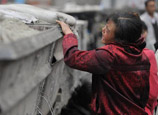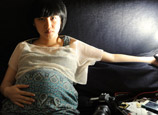
Last September in the Portico Rooms of London's Somerset House, Huishan Zhang watched as models donning his creations paraded at London Fashion Week. A show at one of the world's top fashion weeks was not bad for a designer who only launched his label a year before.
Zhang, 30, a native of the eastern coastal city of Qingdao, quickly grabbed the attention of international fashion watchers with his modern, feminine, Chinese-inspired pieces. His first fall/winter collection, after he attended design school in England, featured blouses, dresses and coats with double-layered lace and Chinese silk brocade. They sold out within a month at a London boutique.
"When I first met him, I thought he was the first young designer who was a perfect creative fusion between East and West, ... a voice we've been waiting to hear," said Sarah Mower, ambassador for emerging talent at the British Fashion Council and contributing editor to US Vogue.
Zhang's work has also drawn attention for redefining "Made in China".
This month, Fast Company, a business magazine in New York, recognized his namesake brand as one of the World's Top 10 Most Innovative Companies in Style. The publication cited it for "proudly making fashion in China".
"Zhang and his team have worked with local manufacturers in his hometown of Qingdao to source intricate fabrics that typically are only produced for bulk orders," it said. "There's nothing cheap or ripped-off about it."
In the 21st century, China wants to become known as a design and innovation center - and no longer just as a manufacturing powerhouse. Its eye is set on creating brands and products that will win the world, much like Apple, Louis Vuitton and Ikea. But to build that reputation, it has to overcome the stigma of churning out subpar, imitation goods.
On the one hand, the government needs to tighten the enforcement of intellectual property rights laws. Besides stemming the flow of copycats, this will help innovators reap the financial fruits of their hard work. On the other hand, families, schools and workplaces need to cultivate thinking outside the box, which is critical to the creative process.
In order to produce pioneering ideas, it's important that Chinese culture evolves so that people are encouraged to be different, said Eric Lee, Shanghai managing director of JWT, one of the world's leading advertising agencies. "Otherwise," he said, "there would be no way for us to contend with outside competitors."

















 How we face 'getting old before getting rich'
How we face 'getting old before getting rich'


![]()
